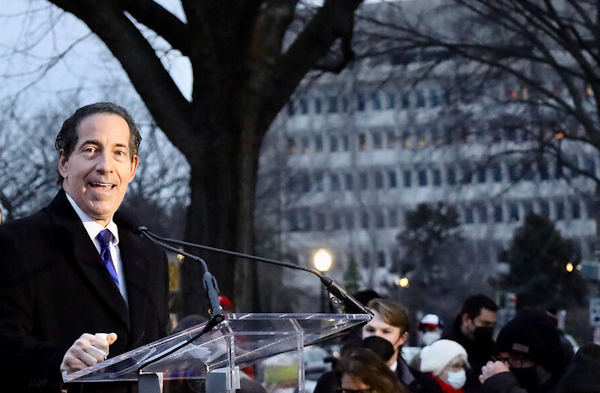SEJournal Online is the digital news magazine of the Society of Environmental Journalists. Learn more about SEJournal Online, including submission, subscription and advertising information.
 |
 |
| Congressman Jamie Raskin, above in 2022, was the sponsor of a House measure to establish a federal shield law. It passed during the last congressional session without controversy. Photo: Joe Flood via Flickr Creative Commons (CC BY-NC-ND 2.0). |
WatchDog Opinion: Federal Shield Law Could Go the Distance This Time
By Joseph A. Davis
It would be big news if this cockamamie Congress could pass the first federal shield law protecting reporters. It should happen. And it could.
Is it politically feasible? The last time Congress seriously considered a shield law was almost a decade ago during the Obama administration. But last September even the wild and crazy House passed a shield law without controversy, by voice vote. No one spoke against it. And no one voted against it.
It was called the PRESS Act (standing for “Protect Reporters from Exploitative State Spying”). The primary sponsors were Sen. Ron Wyden (D-Ore.) (S. 2457) and Rep. Jamie Raskin (D-Md.) (H.R. 4330).
Even Rep. Jim Jordan, who’s angrily
investigating the Biden administration
for “weaponization” of the government,
seems to be for the shield law.
And get this: Even Jim Jordan (R-Ohio) seems to be for it. He’s the one angrily investigating the Biden administration for “weaponization” of the government. But on the shield law, Jordan has refrained from the kind of bitter partisan opposition people have come to expect.
But in the last Congress, as the clock wound down, the bill sat on the agenda of the Senate Judiciary Committee, chaired by Sen. Dick Durbin (D-Ill.), whose priority was approving Biden-appointed judges. There wasn’t enough time on the Senate schedule and it never got out of committee.
As to whether it had the votes in the Senate once it did, that was a different question — because a single determined objection could drastically slow Senate action.
What is a shield law anyway?
Basically, the PRESS Act says that any federal entity (like a court or prosecutor) may not compel a covered journalist to disclose protected information. Such compulsion could take the form of a subpoena or court order.
“Covered journalist” and “protected information” are defined broadly enough to shield almost any reporter protecting a confidential source. There are exceptions for imminent acts of terrorism or violence.
The bill also applies to the many online platforms that might be asked to disclose a journalist’s documents or communications — for example, an email carrier.
The SEJ has endorsed enactment
of a shield law repeatedly over
the years. So have almost all
major journalism organizations.
The Society of Environmental Journalists has endorsed enactment of a shield law repeatedly over the years, going back as far as 2004. So have almost all major journalism organizations.
A coalition of news media groups led by the Reporters Committee for Freedom of the Press last year urged Durbin to advance his bill with a committee vote or action. The coalition included ABC News, the Associated Press, Bloomberg News, Boston Globe Media Partners, CNN, CBS News, Gannett, Hearst, Los Angeles Times, NPR, NBCUniversal News Group, The New York Times, the News Media Alliance, Tribune Publishing and The Washington Post.
Meanwhile, the Biden Justice Department last fall issued a rule forbidding compulsion of reporters to reveal confidential sources. That is a great thing, as WatchDog wrote about it in a column at the time.
We owe Attorney General Merrick Garland thanks. But it is not law. The next administration could come along and undo it with the stroke of a pen. If it were a law it would be more durable.
As November’s WatchDog noted, almost all the states have passed state-level shield laws, and many state officials have called for the feds to do likewise.
There have been numerous versions of a shield law considered by Congress over many years. They all made it illegal for the Justice Department (and others) to compel reporters to disclose confidential sources.
Early in the game
It’s still early, but no shield legislation has been introduced yet in this Congress.
Yet earliness is likely an advantage. If members in either chamber get a bill moving early in the session, it could make any Senate delays less harmful to the bill’s prospects. Waiting until the last minute would only multiply obstacles.
Jordan is more important than ever because he now chairs the House Judiciary Committee, which has jurisdiction over the bill. Few remember that he co-sponsored an earlier bill to shield reporters with Raskin in 2017. Raskin, on the other hand, has not yet been reappointed to the Judiciary Committee.
One thing that needs to happen is for Durbin, as Senate Judiciary chair, to hold hearings, muster votes and bring the bill to the floor. And for other senators, such as shield law champion Wyden, to help work up some enthusiasm.
In the end, though, the Biden administration — especially the president himself — could do a lot by spending some of its political capital and voicing strong and loud support for a federal shield law.
Joseph A. Davis is a freelance writer/editor in Washington, D.C. who has been writing about the environment since 1976. He writes SEJournal Online's TipSheet, Reporter's Toolbox and Issue Backgrounder, and curates SEJ's weekday news headlines service EJToday and @EJTodayNews. Davis also directs SEJ's Freedom of Information Project and writes the WatchDog opinion column.
* From the weekly news magazine SEJournal Online, Vol. 8, No. 9. Content from each new issue of SEJournal Online is available to the public via the SEJournal Online main page. Subscribe to the e-newsletter here. And see past issues of the SEJournal archived here.









 Advertisement
Advertisement 


